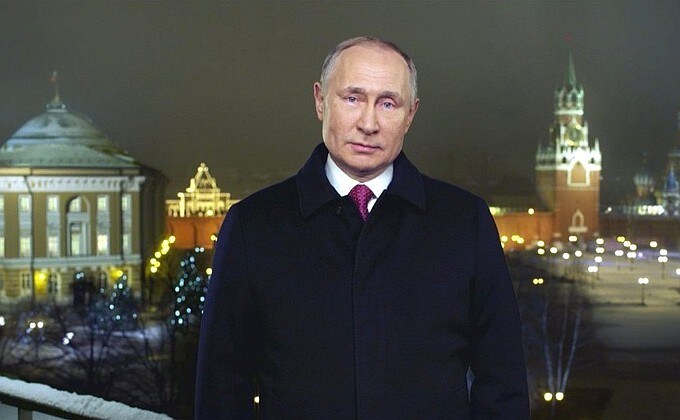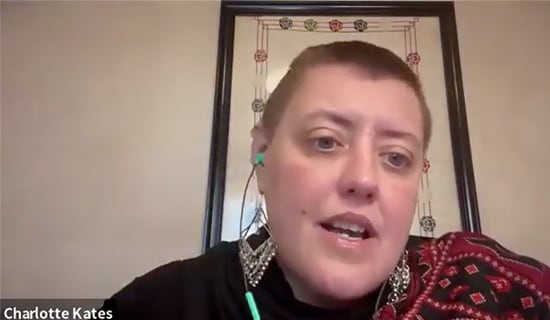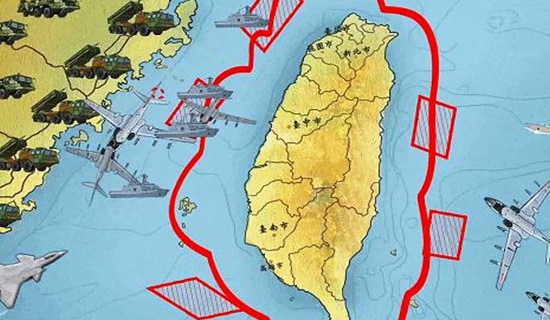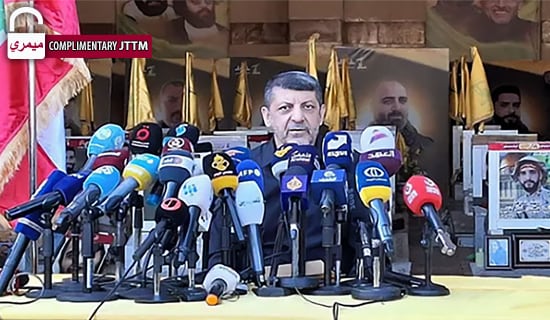Russia This Week is a weekly review by the MEMRI Russian Media Studies Project, covering the latest Russia-related news and analysis from media in Russia, the Caucasus, Central Asia, and Eastern Europe.
Photo Of The Week

(Source: Kremlin.ru)
In The News:
- New Year Address To The Nation
- Christmas Greetings
- Russia's Officials And Media Commentators React To The Killing Of Soleimani
- Russia-Poland Relations
- News In Brief: Nord Stream 2; Russia-Germany Relations; Russia-Libya Relations; Iran, Russia, And China Drills
New Year Address To The Nation
Putin: Our Personal Plans And Dreams Are Inseparable From Russia

(Source: Kp.ru)
On December 31, Russian President Vladimir Putin gave the traditional New Year speech.
Putin: "The year 2020 is just around the corner. We are on the threshold of the third decade of the 21st century. We are living in turbulent, dynamic and contradictory times, but we can and must do everything for Russia to develop successfully, so that everything in our lives changes only for the better. In excited anticipation, we are awaiting the chiming of the clock, and we believe and hope that all our wishes will come true.
"Our personal plans and dreams are inseparable from Russia. Our present and future, and the future of our children depend on the efforts and the contribution of each one of us. Only together will we be able to resolve the tasks facing our society and country today. Our unity is the foundation for achieving the loftiest goals.
"These values were passed on to us by our ancestors, the heroic and unbending generation of victors. Next year, we will celebrate the 75th anniversary of Victory in the Great Patriotic War. With all my heart, I would like to extend my New Year greetings to battle front veterans and home front workers, people of the older generation who have gone through many trials for the sake of us all and the future of our Motherland. I bow down to you.
"Friends, we always prepare for the New Year in advance and, despite being busy, we believe that the warmth of human relations and companionship are the most important thing. We strive to do something important and useful for other people and to help those who require our support, to make them happy by giving them presents and our attention.
"Such sincere impulses, pure thoughts and selfless generosity are the true magic of the New Year holiday. It brings out the best in people and transforms the world filling it with joy and smiles.
"Uplifting New Year's feelings and wonderful impressions have been living in us since childhood and come back every New Year, when we hug our loved ones, our parents, prepare surprises for our children and grandchildren, decorate the New Year tree with them and unpack once again paper cut-outs, baubles and glass garlands. These, sometimes ancient, but beloved family trinkets give their warmth to the younger generations.
"Of course, each family has its own New Year traditions, but everyone is united by an atmosphere of kindness and care. May the happiness of mutual understanding be in your home forever, helping to overcome all difficulties and bringing different generations ever closer. May your parents be blessed with good health and always be the focus of your attention, and may each child know that he or she is the best loved ever.
"Friends, New Year is knocking at our door. Let us wish each other and our Motherland peace and prosperity.
"Happy holidays and a Happy New Year 2020!"
(Kremlin.ru, December 31, 2019; watch the video)
Christmas Greetings

(Source: Kremlin.ru)
On January 7, Vladimir Putin extended holiday greetings to all Orthodox Christians and all Russians celebrating Christmas.
"On these festive Christmas days millions of people around the globe feel joy and inspiration, and a sense of following century-old traditions passed on from generation to generation. Their hearts are filled with love and a belief in the triumph of good and justice.
"The Russian Orthodox Church and other Christian confessions in Russia play a highly constructive role in strengthening the moral and spiritual foundations of Russian society, preserving our nation's historical and cultural heritage, and educating young people. This is a large-scale and fruitful effort of great significance that deserves the most profound recognition.
"I wish prosperity and good health to all Orthodox Christians and all Russian citizens celebrating Christmas."
(Kremlin.ru, January 7, 2020)
Russia's Officials And Media Commentators React To Killing Of IRGC Qods Force Commander Soleimani

Russian soldiers in Syria pay condolences at Iranian Embassy in Damascus (Source: Politryk.ru, January 5, 2020)

Russian soldiers in Syria pay condolences at Iranian Embassy in Damascus (Source: Al-Manar TV)
On January 3, the commander of Iran's IRGC Qods Force, Qassem Soleimani, was killed by the US military in an airstrike on Baghdad airport.
On that very day, Russian Foreign Minister Lavrov held a telephone conversation with his American counterpart, United States Secretary of State Mike Pompeo. In their conversation,"Lavrov stressed that targeted actions by a UN member state to eliminate officials of another UN member state, and on the territory of a third sovereign country without its knowledge grossly violate the principles of international law and deserve condemnation.
"The Russian Minister pointed out that this targeted killing is fraught with grave consequences for the regional peace and stability, and will leads to a new round of escalation. Moscow urged Washington to give up 'illegal military actions to achieve its goals on the international arena and to settle all problems at the negotiating table," the Russian Ministry of Foreign Affairs reported.
On January 4, Lavrov had a telephone conversation with Iran's Foreign Minister Mohammad Javad Zarif, at the latter's initiative. The ministers stressed that this US action was a grave violation of the fundamental standards of international law and does not contribute to resolving the complicated issues in the Middle East. They also added that this action will trigger a new round of escalation in the region.
On January 4, Lavrov discussed the killing of Soleimani also with Turkish Foreign Minister Mevlut Cavusoglu.
Russian President Vladimir Putin and French President Emmanuel Macron expressed their concerns in a phone call over the killing of Soleimani. "The two presidents wished each other a happy New Year. Both sides expressed concern over the death of Qassem Soleimani, commander of the Islamic Revolutionary Guard Corps (IRGC) Quds Force, who was killed as a result of a US strike on Baghdad's airport. It was stated that this attack could escalate tensions in the region," the Kremlin's website reported.
(See MEMRI Special Dispatch No. 8467, Russia's Officials And Media Commentators React To The Killing Of Soleimani, January 6, 2020)
Russia-Poland Relations
Poland Summons Russian Ambassador Over Putin's Claims About WWII
On December 26, the Polish foreign ministry summoned Russian Ambassador Sergey Andreyev over a string of recent claims by President Vladimir Putin about Poland's role in World War II.
(Polskieradio.pl, December 26, 2019)
Russian Ambassador To Poland Andreyev: We Will Not Allow Anyone To Lecture Us
After having a "harsh but diplomatic" discussion with the head of the Eastern Department, Andreyev said he stood by the president's statements as Russia's official position. "We will not allow anyone to lecture us. We have something to say ourselves, on the topic of politics of history," Andreyev told reporters after the meeting.
(Rt.com, December 28, 2019; read the full article)
See also MEMRI Clip No. 7684, Russian TV Anchor Dmitry Kiselev Criticizes the West for Failing to Recognize USSR's Role in Defeating Nazi Germany in WWII, December 29, 2019; MEMRI Clip No. 7675, Russian President Vladimir Putin Criticizes Pro-Hitler Polish Ambassador to Nazi Germany: That Bastard Was an Antisemitic Pig; I Have No Other Words, December 25, 2019
Statement of Polish MFA: The Molotov-Ribbentrop Pact Violated The independence of Poland, Lithuania, Latvia, Estonia, Finland And Romania; The Right Path To Follow In The Polish-Russian Historical Dialogue Is To Re-Launch The Polish-Russian Group For Difficult Issues
The Polish MFA state: "We are concerned and disbelieving to note the statements made by representatives of the Russian Federation authorities, including President Vladimir Putin, about the causes and course of the Second World War.
"They allude to the propaganda messages of the Stalin's totalitarian era, already condemned even by a Soviet leader Nikita Khrushchev. The Ministry of Foreign Affairs of the Republic of Poland wishes to remind the key facts of Polish foreign policy of the pre-war period and Poland-Soviet Union relations as well as the information on the Polish victims of Soviet repressions during the Second World War.
"The Republic of Poland, which regained independence in 1918 after 123 years of captivity and exploitation by the partitioners: Austria, Prussia and Russia, adopted a consistent balanced policy towards both Germany and the Soviet Union.
"The said policy resulted in Poland's efforts to sign a non-aggression pact with the Soviet Union, which was eventually completed on 25 July 1932. Upon Soviet initiative, the pact was prolonged by ten years on 5 May 1934.
"In the same manner, Poland strived to normalize its relations with Germany by means of the German-Polish Non-Aggression Pact of January 1934.
"Despite the peaceful policy pursued by the Republic of Poland, the Soviet Union took direct steps to trigger war and at the same time committed mass-scale crimes. Under the order no. 00485 issued by the then People's Commissar for Internal Affairs in August 1937, 111,000 Poles, Soviet citizens, were murdered and several dozen thousand were deported or arrested (as part of the so-called Polish Operation of the NKVD).
"USSR's actions were approved by the Nazi Germany. After first German claims against Poland made in January 1939, Soviet ambassador in Berlin Andrei Merekalov offered Germany political cooperation on 17 April. Notably, Hitler denounced the Non-Aggression Pact with Poland on 28 April.
"The agreement was sealed by the Molotov-Ribbentrop Pact signed in Moscow on 23 August and its secret protocol under which Eastern Europe was divided into German and Soviet spheres of interest. The protocol violated the independence of Poland, Lithuania, Latvia, Estonia, Finland and Romania.
"On 1 September, Germany launched its cruel military aggression on Poland. On 17 September, as agreed in the Molotov-Ribbentrop Pact, Poland was attacked by the Soviet army, which violated the provisions of the non-aggression pact. At this very moment Poland was struggling against German troops and Polish government remained on the territory of Poland. The Red Army invasion violated international law and customs. On 28 September 1939, the Soviet Union signed another treaty with the III Reich, the Boundary and Friendship Treaty, which sanctioned the division of Polish territory between the two invaders.
"Fifty two per cent of Poland's territory and 13 million of its inhabitants fell under Soviet occupation and were then subjected to mass repressions. In 1939-1941, at least 107,000 people were arrested and over 380,000 Polish citizens were deported deep into the USSR.
"Following the decision of top USSR authorities, nearly all captured Polish army officers and numerous members of Polish elite, that is over 22,000 people, were shot in spring 1940 in Katyn, Tver, Kharkiv and other places of execution.
"In 1940-1941, Soviet authorities carried out four major deportation operations from former Polish lands in February, April and June 1940 and in May-June 1941. The largest groups of displaced persons were sent to the Arkhangelsk oblast, Krasnoyarsk Krai, Swerdlovsk and Irkutsk oblasts, in the Komi Republic and Molotov oblast, and from April 1940 on in Kazakhstan.
"USSR's repressions of Poles continued over the next years. From January 1944 until the end of 1940s, at least 85,000-100,000 Poles (other nationalities not included) were directly victimized on the former Second Republic territory.
"A notorious example of Soviet repressions of Poles was a treacherous imprisonment of Polish deputy prime minister and fifteen other leaders of the Polish Underground State by the Soviet security service. Their show trial was held in Moscow in June 1945. They were sentenced to imprisonment and some of them were most probably killed in prison.
"According to historians, credible calculations put the total number of victims of Soviet repressions from 1939 until after 1944 at 566,000 Poles (including all three categories: arrested, deported and murdered). An estimated 259,000 of Polish citizens, victims of repressions can be identified by name, using the sources available today.
"The Polish side takes the view that the right path to follow in the Polish-Russian historical dialogue is to re-launch the Polish-Russian Group for Difficult Issues which has already had substantial achievements, such as the findings on the USSR's role in the outbreak of the Second World War. With his words, the President of the Russian Federation erased the joint effort of Polish and Russian experts, as well as the legacy of his predecessors, Mikhail Gorbachev and Boris Yeltsin, who – despite all the difficulties - struggled to find the way of truth and reconciliation in Polish-Russian relations. A reliable and critical look at history, instead of propaganda, would allow to pay tribute to millions of victims of Stalinist repressions, also on Russian side."
(Gov.pl, December 21, 2019)
Read More:
- Poland to celebrate heroes of 1920 campaign against Soviets (Polskieradio.pl, January 3, 2020; read the full article)
- Summoning the Russian ambassador to the Polish Foreign Ministry represents Warsaw's attempt to change the situation in its favor, Russian Foreign Ministry's official spokeswoman Maria Zakharova told Rossiya-1 TV channel. (Tass.com, December 30, 2019; read the full article)
- The Polish authorities' approach to building ties with Russia stipulates that current relations depend on interpreting historic events, Russian Foreign Ministry Spokeswoman Maria Zakharova said in an interview with Rossiya-24 TV channel. "There are two ways: the first one is to learn from historic mistakes, the errors of the past and to draw conclusions and move forward, building the future and understanding history. The second way is to endlessly make one's future and the future of neighboring countries, regions and the world dependent on the interpretation of history and history in principle," Zakharova said. (Tass.com, December 25, 2019; read the full article)
- Remarks by US Ambassador to Poland Georgette Mosbacher about the alleged collusion between Hitler and Stalin on the partition of that country encourage Warsaw to continue spreading historical lies, Chairman of the Russian State Duma's Foreign Affairs Committee Leonid Slutsky told reporters. "Remarks by the US ambassador to Poland about the collusion between Stalin and Hitler are not just ignorant, they embolden Warsaw to keep on spreading historical falsehoods," Slutsky said, stressing that this encouraged Poland to "embark on state-sponsored malicious mischief." (Tass.com, December 31, 2019; read the full article)
- The Polish authorities must apologize for their country's actual collaboration with Nazi Germany in the 1930s, Russian State Duma Speaker Vyacheslav Volodin said at Russian President Vladimir Putin's meeting with the top officials of the Federal Assembly in Moscow. (Tass.com, December 24, 2019; read the full article)
News In Brief:
Nord Stream 2
- No More Delays! Nord Stream 2 Building Will Continue in 2020 DESPITE Sanctions By US! "Here's some bad news for the U.S., which comes too often these days. Despite the fact that the sanctions against European companies building Nord Stream 2 took effect, there will be no delays. The laying of pipes along the bottom of the Baltic Sea from Russia to Germany has been suspended. It was done so that American liquefied gas flowed to Europe instead of our pipeline gas… Minister of Energy Alexander Novak assured that Russia can complete our pipeline using our own resources. And this will be done in 2020." (Vesti, December 30, 2019; watch the video)
Russia-Germany Relations
- German Chancellor Angela Merkel will arrive in Russia on a working visit on January 11 on the invitation of Russian President Vladimir Putin, the Kremlin's press office reported. "During the talks, the sides intend to discuss essential issues of the international agenda, including the situation in Syria and Libya, the escalation of tension in the Middle East as a result of the US airstrike on Baghdad Airport on January 3," the Kremlin press office reported. (Tass.com, January 6, 2020; read the full article)
Russia-Libya Relations
- The New Arab newspaper reported that a Russian Air Force jet had transported Russian mercenaries from a private military firm in Russia, just like Wagner Group, from Syria to Libya as per coordination between Moscow and Khalifa Haftar under the supervision of UAE and Egypt. The newspaper said two Russian aircraft landed in Benghazi airport over the last three days coming from Syria with Russian mercenaries from two private firms (Moran and Schit Security Groups) on board in addition to Syrian contractors who work for the Russian forms in Syria. (Libyaobserver.ly, January 6, 2020; read the full article)
Iran, Russia, And China Drills
- Iranian President Hassan Rouhani has highlighted the significance of the recent naval drills jointly held by Iran, Russia and China in the Indian Ocean and the Sea of Oman, stressing that the unprecedented military maneuvers infuriated the US and its vassal states in the region. (Presstv.com, December 31, 2019; read the full article)
- Naval maneuvers jointly carried out by Iran, Russia and China in the Sea of Oman and the Indian Ocean have caused fear and horror among those countries attempting to undermine security in the region, the Islamic Revolution Guards Corps (IRGC) said. (Presstv.com, December 30, 2019; read the full article)
- The assassination of Qassem Soleimani, an Iranian major general in the Islamic Revolutionary Guard Corps (IRGC) and commander of the Quds Force, in a targeted US air strike on 3 January came on the heels of joint naval exercise launched by Russia, Iran and China in the Indian Ocean and Gulf of Oman. The "growing Russia-China-Iran trilateral convergence", as The Diplomat dubbed it in late December, is seemingly hitting a raw nerve in Washington: speaking to Islamic Republic of Iran Broadcasting (IRIB) on 2 January, Rear Admiral Khanzadi, the Iranian navy commander, said that Washington and its allies had held an emergency meeting aimed at disrupting the drills. (Sputniknews.com, January 7, 2020; read the full article)








